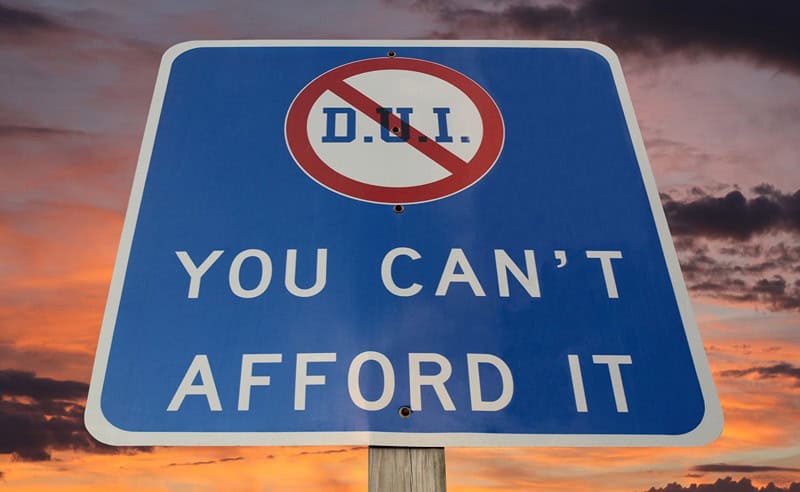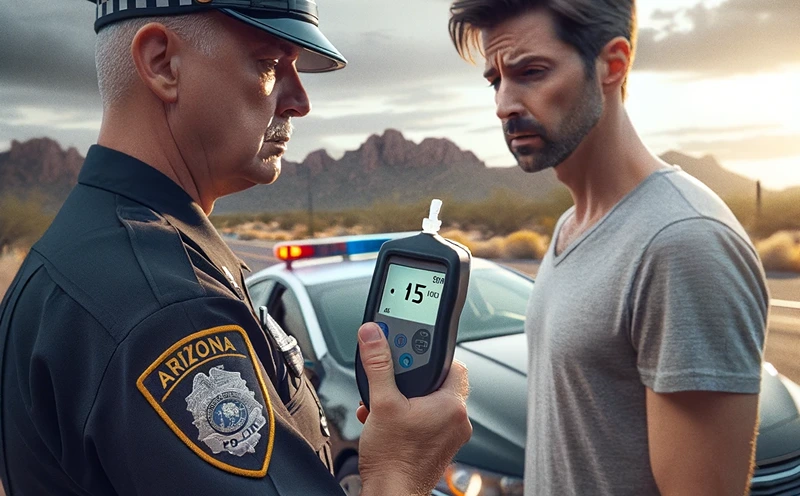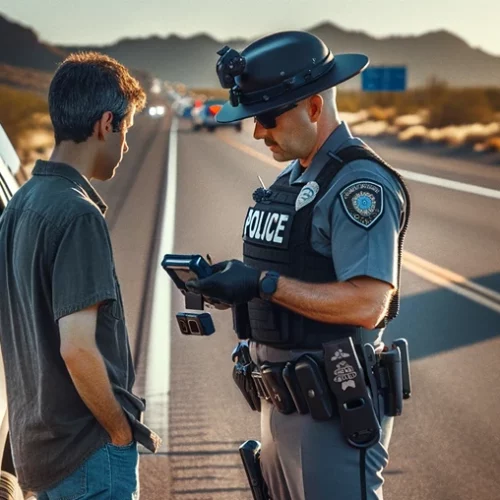What is Arizona’s Implied Consent Law?
Implied consent in Arizona, as outlined in ARS § 28-1321, refers to the automatic agreement by drivers to submit to chemical testing if law enforcement suspects them of driving under the influence. When you receive your driver’s license in Arizona, you are giving your implied consent to be tested for blood alcohol concentration (BAC) or drug levels if a law enforcement officer has reasonable grounds to believe you are impaired.
The test may include a breath, blood, or urine test, and the officer typically decides which type of test will be administered. Refusing to submit to this testing can have serious consequences, including an automatic suspension of your driving privileges, even if you are not ultimately convicted of a DUI.
Preliminary Breath Test Vs. Breathalyzer Test
In this article, we explore the differences between a Preliminary Breath Test (PBT) and a Breathalyzer test in Arizona DUI cases. The PBT, often used during traffic stops, provides a quick estimate of blood alcohol concentration (BAC) but is less reliable than the Breathalyzer test used later in DUI processing. Attorney Arja Shah discusses the common problems with PBTs, including accuracy issues and false positives, and clarifies your right to refuse the test. We also cover the legal implications of these tests, highlighting the importance of having a skilled defense attorney to protect your rights.
Defense Strategies For Commercial DUI Charges
Facing a DUI charge is challenging for any driver, but for commercial drivers, the stakes are significantly higher. Commercial DUI charges not only threaten your ability to drive a commercial vehicle but also jeopardize your livelihood and future career prospects. In Arizona, the legal blood alcohol content (BAC) limit for commercial drivers is just 0.04%, half of the limit for non-commercial drivers.
Can a Passenger Be Charged With a DUI?
When most people think of a DUI, they envision a driver behind the wheel who has been drinking and is operating a vehicle while under the influence. However, what many may not realize is that a passenger can also be charged with a DUI under certain circumstances. This can be a shocking revelation for those who assumed they were safe from such charges simply by being a passenger. In this article, we will explore the situations in which a passenger can be charged with a DUI, and how to avoid finding yourself in this legal predicament. From being in a car with a driver who is under the influence to underage drinking while in a vehicle, there are various scenarios that can lead to a passenger facing a DUI charge.
DUI and Child Endangerment: Dual Charges and Defense Tactics
Driving under the influence (DUI) is a serious offense that can have severe consequences, both legally and personally. But when a DUI also involves child endangerment, the stakes are raised even higher. In cases where a driver is not only under the influence of drugs or alcohol, but also has a child in the vehicle, dual charges of DUI and child endangerment can lead to harsh penalties including a felony conviction.
FAQS: Domestic Violence Charges
Under Arizona Revised Statutes (ARS), a domestic violence charge can be brought against someone if they are accused of committing a criminal offense against a current or former intimate partner, family member, or household member. This can include acts such as assault, harassment, or stalking.
What is The Difference Between Simple and Aggravated Assault
In the state of Arizona, there are two main types of assault charges: simple assault and aggravated assault. While both involve intentionally causing harm or fear of harm to another person, there are key distinctions between the two.
Simple assault is considered a misdemeanor offense, punishable by fines and potential jail time. This type of assault typically involves minor injuries or threats of violence. On the other hand, aggravated assault is a felony charge in Arizona, carrying more severe penalties, including lengthy prison sentences.
Disorderly Conduct in Arizona: ARS 13-2904
Imagine a heated argument at a neighborhood block party. Voices raise, tempers flare, and what started as a disagreement escalates into a shouting match. Suddenly, someone calls the police, and before you know it, you’re being charged with disorderly conduct. Situations like this are more common than you might think and can quickly turn an everyday occurrence into a legal nightmare. Disorderly conduct, as defined by ARS 13-2904, encompasses various behaviors intended to disturb the peace.
What is a Phantom DUI Checkpoint ?
You’ve probably seen DUI checkpoints set up by law enforcement to catch impaired drivers and deter drunk driving. But did you know there’s a strategy known as a phantom DUI checkpoint? Unlike traditional sobriety checkpoints where vehicles are stopped and drivers are checked for signs of intoxication, phantom checkpoints use signs and the visible presence of police vehicles to create the illusion of an active checkpoint. Understanding the concept of phantom DUI checkpoints, their legal standing, and your rights when encountering them can help you handle these situations more effectively.
Can You Reduce a DUI Charge to Reckless Driving in Arizona ?
Reducing a DUI charge to reckless driving in Arizona is possible with the help of a skilled DUI defense attorney. An experienced lawyer can negotiate with prosecutors, challenge evidence, and highlight mitigating factors to achieve a lesser charge. The advantages include reduced penalties, lower fines, fewer driving record points, and less impact on insurance and employment. First-time offenders, in particular, have a higher chance of obtaining a reduced charge. Contacting an experienced DUI defense attorney like Arja Shah, known for her successful track record in defending DUI cases, is crucial for achieving the best possible outcome.
How Police Misconduct Can Affect a DUI Charge
Police misconduct can significantly impact the outcome of a DUI case. If it can be shown that the arresting officer violated protocol or the law, the evidence collected may be deemed inadmissible. For instance, if the stop was made without reasonable suspicion, any subsequent evidence of intoxication could be thrown out, weakening the prosecution’s case. This can lead to charges being reduced or even dismissed.
What is Reasonable Suspicion & Probable Cause for a DUI Arrest
In the world of DUI arrests, two key legal concepts play a crucial role in determining whether a police officer’s actions were justified: reasonable suspicion and probable cause. A police officer must have probable cause to make a DUI arrest, which means they must have enough evidence to believe that a crime has been committed.
On the other hand, reasonable suspicion is the lower standard that allows a police officer to pull over a vehicle for further investigation if they have a reasonable belief that the driver may be violating the law.
Resisting Arrest During a DUI Stop: Penalties and Defenses
In Arizona, resisting arrest is defined under Arizona Revised Statutes (ARS) 13-2508. This statute outlines that a person commits resisting arrest by intentionally preventing or attempting to prevent a peace officer, acting under official authority, from effecting an arrest by either using or threatening to use physical force against the officer or another, or by using any other means creating a substantial risk of causing physical injury to the officer or another.
This can occur during a DUI stop if the individual attempts to flee, physically obstructs the officer, or fails to comply with the officer’s commands in a manner that poses a risk
State DUI Laws: Toughest Vs Most Lenient
Arizona is frequently cited as having the most rigorous DUI laws in the nation for first-time offenders. The state implements stringent measures that are often reserved for repeat offenders in other regions. One notable aspect of Arizona’s DUI penalties is the mandatory use of an Ignition Interlock Device (IID) for all DUI convictions, including those involving first-time offenders. This policy is typically seen in other states for more severe cases or as part of alternative sentencing options.
Rising Blood Alcohol as a DUI Defense Strategy
“Rising Blood Alcohol” is a concept in DUI defense that addresses the physiological and temporal aspects of how alcohol is absorbed into the bloodstream. When alcohol is consumed, it doesn’t immediately reach its peak concentration in the blood. Instead, the alcohol must first be absorbed through the gastrointestinal tract before it enters the bloodstream and travels to the liver to be metabolized. This process means that there is a delay between the time alcohol is consumed and when it reaches its highest concentration in the blood. If a person is tested for their BAC (Blood Alcohol Concentration) shortly after drinking, their alcohol level may still be rising. Therefore, their BAC at the time of testing could be higher than it was at the time of driving.
Penalties for Driving Without a License in Arizona
In Arizona, it is illegal to operate a motor vehicle without possessing and carrying a valid driver’s license. According to Arizona Revised Statute 28-3151, all drivers are required to have a license that is officially issued to them. When someone is caught driving without a license, the penalties can vary depending on the specific circumstances. For instance, if an individual has never obtained a license, the legal repercussions might be more severe compared to someone whose license has expired. Typically, the initial penalty for driving without a license includes a fine.
Get Help Restoring Your Gun Rights in Arizona
In contrast to misdemeanors, felony convictions generally result in the automatic loss of firearm rights in Arizona, as outlined in ARS 13-904. The prohibition remains even after the individual completes their sentence unless their rights are explicitly restored by a court. Restoring gun rights after a felony conviction involves meeting specific eligibility requirements. An individual must have completed all aspects of their sentence, including probation, parole, and payment of fines and restitution.
Cinco De Mayo DUI Checkpoints and Arrests
Nationwide, DUI arrests spike by 25% to 30% during Cinco de Mayo, and drunk driving is responsible for about 40% of all traffic fatalities during this period, according to the National Highway Traffic Safety Administration (NHTSA).
In Arizona, particularly in Maricopa County, over 500 DUI arrests can be reported over the Cinco de Mayo weekend, with a considerable number being classified as extreme DUIs (BAC of 0.15% or higher). The demographic most at risk are males aged 21 to 35, who constitute the majority of these arrests.
How are Field Sobriety Tests Used In a Boating DUI
In Arizona, law enforcement agencies have the authority to set up boating DUI checkpoints, similar to roadside sobriety checkpoints, to combat and deter Operating Under the Influence (OUI) offenses on waterways. These checkpoints are designed to systematically check boaters for signs of intoxication and are legally upheld under guidelines that ensure they are conducted fairly.
Restoring Voting Rights in Arizona
In Arizona, a felony conviction significantly impacts an individual’s civil rights, most notably resulting in the automatic suspension of their voting rights. This is articulated within the Arizona Revised Statutes (ARS), including provisions for restoration under ARS § 13-912 for first-time offenders and ARS § 13-905 for those with multiple convictions. This suspension underscores the profound societal implications of felony charges, extending the consequences of criminal behavior to include the loss of a fundamental democratic privilege—the right to vote.
Read moreTIP: Save our number in your phone just in case!
Create a new contact as “Shah Law Firm – Lawyer” 602-560-7408
Country Thunder DUI, MIC, MIP, and More
Country Thunder Arizona 2024 promises an unforgettable experience at Canyon Moon Ranch near Florence, from April 11-14. This festival draws roughly 30,000 daily visitors, including fans, vendors, and law enforcement, creating a vibrant and diverse atmosphere. Headliners like Lainey Wilson, Jelly Roll, Eric Church, and Koe Wetzel lead an impressive lineup. The event also offers a range of ticket options, from general admission to VIP experiences, alongside practical amenities for camping and parking.Amidst the excitement and music, attendees must be mindful of the law, particularly regarding DUI, MIC, and MIP. The festival’s large crowds and celebratory atmosphere can increase the chances of encountering legal issues. Should you or someone you know face such charges, it’s crucial to seek expert legal assistance.
March Madness and DUIs in Arizona: Get Help from a Criminal DUI Lawyer
Phoenix is gearing up to host the thrilling NCAA Final Four Fan Fest from April 5th to 8th at the Phoenix Convention Center, downtown. This annual celebration promises basketball fans and families an exciting blend of sports, entertainment, and community spirit.If you’re driving home after celebrating at the Final Four Fest and have had a few drinks, being pulled over by law enforcement can be intimidating. Here’s how to handle the situation wisely and protect your rights:
Reckless Driving in Arizona Defenses to ARS 28-693
Arizona’s Reckless Driving Law, codified under Arizona Revised Statutes (ARS) 28-693, defines reckless driving as the operation of a vehicle with a reckless disregard for the safety of persons or property.According to this statute, reckless driving is not merely about a single driving error or minor misjudgment; instead, it pertains to a pattern or instance of driving behavior that demonstrates a clear lack of concern for the established rules of the road and the well-being of others.This can include, but is not limited to, speeding excessively, aggressive weaving through traffic, ignoring traffic signs and signals, or engaging in dangerous maneuvers without regard for the potential consequences.
How is Police Body Camera Footage Used in a DUI Case
It’s important for defendants to understand that while bodycam footage can be important evidence, its admissibility is not automatic. The defense has the opportunity to challenge the footage on several grounds, such as questioning its relevance, the manner in which it was obtained, or its integrity.



























